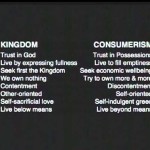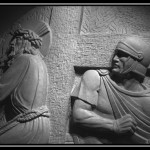We run our website the way we wished the whole internet worked: we provide high quality original content with no ads. We are funded solely by your direct support. Please consider supporting this project.

Little Pacifism
Richard Beck spoke about something he names Little Pacifism on his Experimental Theology website. It’s so easy, in the name of peacemaking, to become angry and aggressive. I suppose this is just part of what it means to be human. However, if we hope to bring the Kingdom of God closer the earth (and to our neighborhoods) it just makes sense to start small, to start where we are. Let’s not behave violently, in the name of non-violence. And, by all means, let’s try to avoid being jerks whenever possible.
From the article:
I think one of the biggest failures of the pacifistic witness is when we don’t practice nonviolence in our personal relations. Pacifism is too often projected onto the global scale. The conversation becomes almost exclusively about war between political powers. And no doubt that’s an important conversation. But it can get a little abstract and philosophical. And some pacifists can be less than charitable toward others. Let’s call this big conversation heroic pacifism.
Me? I don’t think a lot about heroic pacifism. I probably should, but I spend most of my time thinking about violence in my personal relations, how I treat people–my family, people at work, people at church, people in the line at the store, commenters on this blog. My practice of nonviolence isn’t heroic in scale. I practice a little pacifism, a small pacifism. I try not to be a jerk.
Image by David Goehring. Sourced via Flickr.
Category: General
Tags: Kingdom Living, Non-Violence
Related Reading

Responding to Driscoll’s “Is God a Pacifist?” Part I
I’m sure many of you have read Mark Driscoll’s recent blog titled “Is God a Pacifist?” in which he argues against Christian pacifism. I’ve decided to address this in a series of three posts, not because I think Driscoll’s arguments are particularly noteworthy, but because it provides me with an opportunity to make a case against what I’ve…

Consumer Wars: Sermon Clip
To go along with our other post today, here’s a clip from Greg’s sermon last week. If you don’t have any financial margin in your life, this might have something to do with it. You can find the entire sermon here.

The Politics of Jesus
Many are so conditioned by the mindset of the world that they can’t even envision an alternative way of affecting society and politics other than by playing the political game as it is done by the established governmental system. Some thus conclude that, since Jesus didn’t try to overhaul the political systems of his day…

How Revelation Uses Violent Images in an Anti-Violent Way
All the violent scenes in Revelation are symbols for the battle of truth and deception. They never involve literal violence. In fact, they symbolize ANTI-VIOLENCE. The ingenious way John helps us get free of deception of trust in violent power is by taking a standard violent symbol and juxtaposing it with a symbol that undermines…

Why Did Jesus Curse a Barren Fig Tree?
While no one argues that the NT advocates violence explicitly, many allege that some passages reflect violent attitudes toward outsiders, and especially toward non-believing Jews, while others detect an element of violence in some of Jesus’ teachings and behavior. Some scholars argue that this violent aspect of the NT laid the groundwork for later Christian…

Why NO Violence in Jesus’ Name is Justified
Image by papapico via Flickr On Friday, Greg posted a response to Obama’s speech about religiously-inspired violence. Here are some further thoughts on why violence in the name of Jesus—no matter whether we call it just, redemptive, or defending ourselves—is just another form of kingdom-of-this-world living. The love we are called to trust and emulate is supremely…
